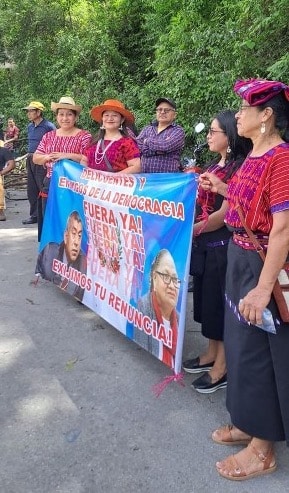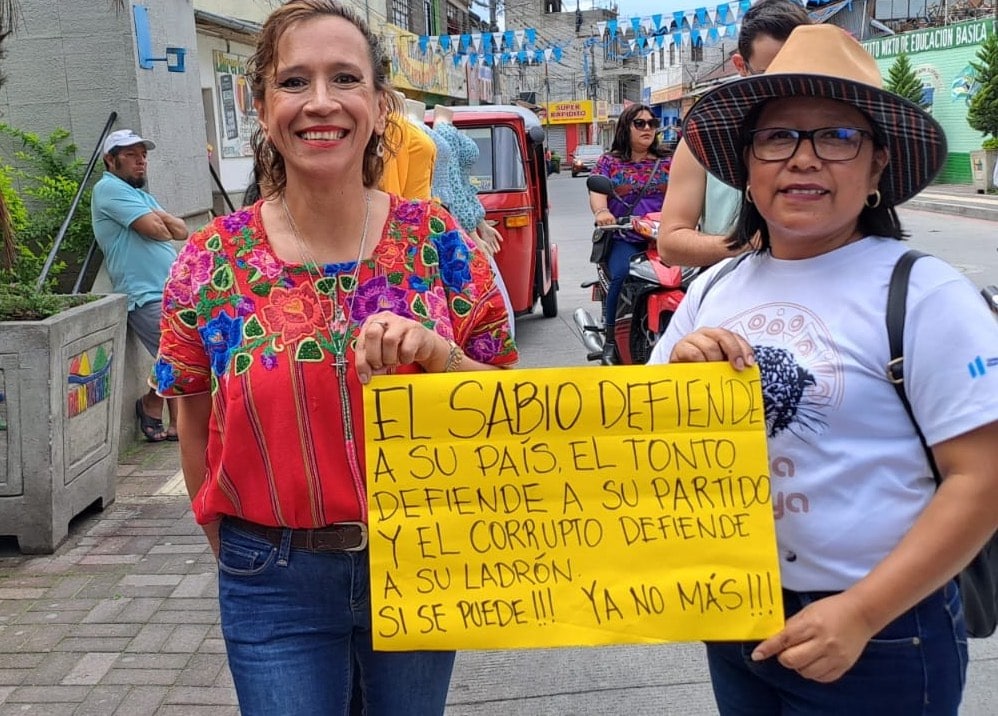Image courtesy of Ninette Rodas.
By Dr. Michelle Watts
Assistant Department Chair, School of Security and Global Studies
and Sandra Chiroy
Director of Education Programs, Fundamaya
In Guatemala, a situation that deserves the world’s attention has been brewing for some time. Although the conflict in Guatemala does not have the burning intensity or the tragic death toll of what is happening in the Middle East, current events are of paramount importance for the future of democracy in Guatemala and the human rights of its citizens. It is also likely to influence other governments in the region.
Guatemala Has Its Share of Corrupt Officials
The months before the June elections in Guatemala were marked by corruption early on. As a Guatemala City taxi driver remarked to me on my way to the airport in March 2023, those in power had already disqualified several candidates who seemed to offer the chance of change.
Guatemala held its first round of elections on June 25. Miraculously, in the run-off elections on August 20, the progressive, anti-corruption candidate Bernardo Arévalo earned the majority vote and became the new president of Guatemala, expected to take office on January 14, 2024.
In Guatemala, there is what is known as a “pact of the corrupt.” As IPS reporter Knut Henkel explains, there is an alliance between the Guatemalan oligarchy, criminal networks and military leaders.
These powerful groups work together to protect each other and advance their own economic and political well-being. Contrary to the Guatemalan law designating the Supreme Electoral Tribunal to review and count ballots, the Attorney General’s Office has opened boxes and photographed the contents, “breaking the chain of custody” that the Tribunal follows to verify votes.
President-elect Arévalo’s family has a distinguished history in Guatemala. His father, Juan José Arévalo Bermejo, was the first president elected democratically in 1944.
Among other achievements, he worked to help Indigenous peoples in Guatemala; this legacy was likely important in the support Bernardo Arévalo received. Political parties in Guatemala often compete to buy Indigenous votes, but in this case, the public will was strong enough to thwart such attempts.
However, the corrupt groups in power are doing everything they can to roll back this win by Arévalo. They have accused Arévalo’s political party Movimiento Semilla (“Seed Movement”) of election irregularities starting in 2019.
Protests and Pushback in Guatemala
In defiance of the attempts to discredit Arévalo, organized Indigenous groups and farmers across Guatemala are not standing for it. They blocked key roadways throughout the country for 26 days, according to AP News. Protesters also demanded the resignation of the officials, including Attorney General Maria Consuelo Porras, who are leading the investigation against Arévalo’s party.

However, Guatemala’s current president, Alejandro Giammatei, does not seem willing to concede the usurpation of power that is being attempted. Instead, Giammatei has used the National Police to disperse blockades and protesters according to ABC News.
Giammatei has threatened protesters and alleged that foreigners are behind their activism. This claim is a common tactic used in Guatemala and other Central American countries when leaders seek to delegitimize protestors.
KVIA says that supporters of Attorney General Porras have allegedly instigated violence against peaceful protestors, resulting in attacks that have led to injuries and a death in the Department of San Marcos. In Jutiapa, Indigenous leader Noé Gómez Barrera, respected for his advocacy of human rights, was assassinated, according to Native News.
Attorney General Porras, who has been designated as a “corrupt and undemocratic actor” by the Department of State according to Reuters, may yet seek an arrest warrant for Arévalo. Also, there have been “credible threats” to the lives of Arévalo and his running mate Karin Herrera, notes Responsible Statecraft. At least one of these threats is believed to come from government officials.
Related: Cuba Gains a Not-So-New Listening Post, Courtesy of China
A History of Atrocities and Abuse
Protesting and speaking out in Guatemala incurs risks for anyone, but the Indigenous population has historically been mistreated. Investigators found that the Guatemalan military committed genocide during Guatemala’s prolonged civil war, according to PBS. Approximately 200,000 people were murdered and 83% of the victims were Indigenous Mayans, according to the United States Institute of Peace.
While the civil war ended in the late 1990s, Guatemala has not become a bastion for free speech or progressive politics. The anti-corruption committee, the International Commission Against Impunity in Guatemala (CICIG), was expelled in 2019 under the administration of Jimmy Morales, a former comedian.
Morales followed the path of most Guatemalan presidents, choosing self-enrichment and elite interests over democratic values. He remains under investigation by the CICIG, according to the Washington Office on Latin America.

The Cost of Defying Corruption
In their effort to break the cycle of government corruption, Indigenous groups and other citizens of Guatemala are not only putting themselves at risk but inflicting economic pain on communities in Guatemala. The blockades have had an economic impact; grocery prices are going up and gas is scarce.
According to an email from Sharon Smart of the nonprofit Fundamaya, many of the families her organization works with were unable to work or receive pay for three weeks. Others lost their jobs.
Guatemala’s airport has been closed intermittently, and many people have lost income from not being able to work and a loss of tourism. Also, Guatemala sought help from El Salvador to ensure adequate fuel for airplanes.
The production of goods and trade has been affected, raising concerns that businesses will not be able to fulfill their contracts. El Salvador relies on Guatemala for many products. The blockade is having a ripple effect, hurting El Salvador’s export sector and raising the price of staples in El Salvador as well according to OMG Bulletin.
In many places in Guatemala, schools had to close. Nonetheless, groups in charge of the blockades are making efforts to open roads to allow normal life to continue to some extent. Roadblocks have been removed according to Latin News, but the protests continue.
It is notable that these protests were supported by the general public despite the economic pain. As Journal of Democracy reporters Manuel Meléndez-Sánchez and Laura Gamboa explain, this support is partly due to the track record of effectiveness Indigenous organizations have built up and their careful goal-setting for this situation.
Observers on the ground note that people remain united in their fight, knowing how important the outcome will be for future generations. People involved in protests represent all of Guatemala – Maya, Xinca, Garífuna, and Mestizos, young and old – have all participated with the goal of seeing that the democratic process is followed in Guatemala.
Related: Peru: Internal Unrest Reduces Hope for a Stable Government
The US and Other Countries Need to Stand By Guatemala
Mary Speck, an expert on Latin America for the United States Institute of Peace, notes that the Indigenous protests “could …prove a watershed moment for Guatemala democracy.” It is unusual for Indigenous groups to get involved in national political issues. Given the financial cost of blockades and the physical danger they may be in, their continued protests indicate the seriousness of the political situation in Guatemala.
Congressional representatives Vern Buchanan, Dina Titus and Norma J. Torres, members of the House Democracy Partnership (HDP), sent a letter to Secretary of State Anthony Blinken. The letter implores, “We urgently request the U.S. Administration encourage a peaceful transition of power and work with international partners to prevent further backsliding. Moreover, we ask the U.S. Administration to voice support for the legitimacy of President-elect Arévalo and the Semilla party before the election period ends.”
As Speck explains, the U.S. can do more. It could go beyond canceling visas for corrupt Guatemalan politicians and hit them where it might hurt a bit more: freezing their assets. Former Ambassador to Guatemala Stephen McFarland urges the U.S. to use “Magnitsky sanctions” to disrupt the “pact of the corrupt,” according to America’s Quarterly. Moreover, he urges a renovation of the Department of Justice’s mission to investigate corruption in Central America.
This situation that is worthy of not only attention but action by the U.S. and the international community, particularly the Organization of American States. If the corrupt elite in Guatemala succeed in not allowing the rightfully elected candidate to take his seat or in undermining the government to the extent that it can accomplish nothing, that will be a serious setback. This setback will be a strike against democracy in the Americas but also for human rights and freedom of speech for the citizens of Guatemala.
Matthew Miller, a spokesperson for the Department of State, notes that “The Guatemalan people have spoken. Their voice must be respected.” Failing to do so will allow a corrupt elite to triumph in Guatemala.
About the Authors
Dr. Michelle Watts is the Assistant Department Chair for the Department of Security and Global Studies, where she also teaches in the doctoral program. She has a degree in International Studies from American University, a master’s degree in Latin American Studies from the University of Arizona, and a Ph.D. in International Development from the University of Southern Mississippi.
Dr. Watts has collaborated with colleagues on nine research grants encompassing a wide range of topics. Her work includes “Bomberos, Maestros y Psicólogos: Guatemalan Civil Society Response to the Volcano of Fire Disaster,”“Making Sovereignty Mean Something: Native Nations and Creative Adaptation,” “Drugs, Thugs, and the Diablos Rojos: Perils and Progress in Panama,” “Seguridad del Canal de Panamá: Una Década Después de la Salida de Estados Unidos” (Security of the Panama Canal: One Decade after U.S. Departure), and “Game of Norms: Panama, the International Community, and Indigenous Rights.” She is the principal investigator for the research study, “A Case Study Comparison of Pandemic Experience of Indigenous Groups in the Americas.”
Ms. Sandra Chiroy is the Director of Education programs for the non-profit Fundamaya, dedicated to supporting education for children in rural communities of Sololá in Guatemala. Her heritage is Maya-Kaqchikel. Sandra has a master’s degree in social work and in community counseling from the Universidad del Valle de Guatemala. She is the first woman in her family to graduate from a university and has always wanted to help other women achieve their educational goals and facilitate their development.
In addition to her work at Fundamaya with Indigenous communities, Sandra participates in an Indigenous Women’s group that has the goal of empowering and defending the rights of Indigenous women in Guatemala. She has also taken part in a course for the development of young female Indigenous leaders, emphasizing civil action, which led to being part of the Indigenous Women’s Electoral Observation committee for the 2023 election in Guatemala.

Comments are closed.